St. Ambrose Piano Professor Performs Monday on Iowa Public Radio Steinway Series
The day last August that Marian Lee was to be the first female pianist to play for Iowa Public Radio’s (IPR) Steinway Café series, was the day after the devastating derecho swept through the Midwest.
The St. Ambrose University associate professor of piano rescheduled her virtual appearance to this Monday at noon. Lee’s pre-recorded 45-minute program (filmed at SAU’s Madsen Hall) will be available on IPR’s Facebook page and Ambrose music department’s Facebook. Lee
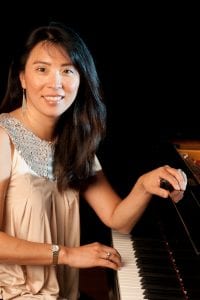
Marian Lee is associate professor of music at St. Ambrose University.
will be watching and answering viewer questions in real time on the IPR site.
“I was really surprised to find I was the first female pianist they’ve had,” she said Saturday. IPR Classical launched the Steinway Café series after they restored a 1918 Steinway B piano in 2019. In the pre-pandemic world, they hosted in-studio performances in Cedar Falls, but due to Covid, they reinvented the series to make it available for live-streaming on Facebook and YouTube.
“Historically, while women were occasionally noted for their musical abilities, they often took a backseat when it came to appearing as soloists or members in a symphony orchestra,” according to an IPR article on the series. “Fortunately, those days are over!”
Last month, Lee starred with the Quad City Symphony Orchestra on their digital concert, soloing at the Adler Theatre on Bach’s Keyboard Concerto No. 5.
Saturday, she said that while there are many female pianists studying in colleges, universities and conservatories, they remain a minority in those who make a living as pianists. “There are lot more men actually in music and concert series,” Lee said.
Teaching at Ambrose since 2012, Lee earned her bachelor’s and master’s in piano performance at New York’s prestigious Juilliard School, and was awarded the coveted Fulbright Grant to study at the Moscow Conservatory in what was then the Soviet Union. During her three-year stay, Lee witnessed the fall of the Soviet Union in 1991 and toured extensively within the former USSR.
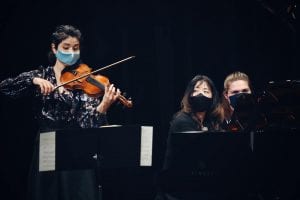
Lee accompanied violinist Naha Greenholtz last August at SAU’s Galvin Fine Arts Center.
Seeing this past Wednesday’s violent mob riot at the U.S. Capitol (which killed five Americans) brought back memories for her, of the August 1991 coup attempt in Moscow, which led to the fall of the Soviet Union.
“I’ll never for that was the day they kidnapped Gorbachev, and the Communist Party attempted a coup,” Lee said. “Of course, it’s completely a different situation. Thankfully, it was a relatively bloodless revolution at the time. Democracy is messy.”
She was in Russia from 1991 to 1994, and got to see the birth of the independent republics that broke apart from the former USSR. “It was fascinating, like the Wild West back then. To see that kind of chaos in our own nation’s capital, under different circumstances, I never thought I’d see a sight like that. It was scary, terrifying actually.”
Upon her return to the U.S. in the ‘90s, Lee completed her doctoral degree at the Peabody Conservatory of Music at The Johns Hopkins University.
She made her New York City debut at Carnegie Hall’s Weill Recital Hall as winner of the Artists International Award and has appeared as soloist and with orchestra internationally in Austria, Belgium, Italy, France, Norway, Russia, Azerbaijan, Turkmenistan, Poland, Brazil, Estonia, Hong Kong, and Thailand, as well as in Lincoln Center, the Kennedy Center’s Millennium Stage, Seattle’s Benaroya Hall, Moscow’s Tchaikovsky Hall and Rachmaninoff Hall, and the Hermitage Winter Palace in St. Petersburg, Russia.
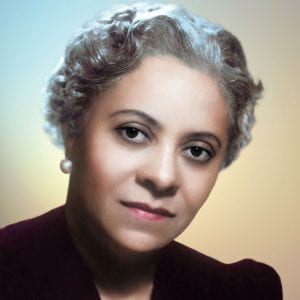
Florence Price (1887-1953) was the first black female composer to have her work performed by a major U.S. orchestra, in 1933 in Chicago.
Monday’s program is very personal for Lee – choosing pieces that she’s not only enjoyed playing, but have strong relevance today, with significance to the time we’re living in.
Since later this month is Martin Luther King Day, she wanted to pay tribute to an African-American composer, so Lee is performing Florence Price (1887-1953), the first black female to have her work played by a major U.S. orchestra. The Chicago Symphony performed her Symphony No. 1 on June 15, 1933.
Lee is playing the haunting and poignant Andante second movement from the Sonata in E minor by Price. In August, Lee partnered with QCSO concertmaster Naha Greenholtz in performing Price’s violin “Fantasie” at SAU’s Allaert Auditorium, when only 50 patrons were allowed in person and it was also livestreamed.
Lee was inspired by this past year’s Black Lives Matter protests to program Price.
During Price’s career, she composed over 300 works and also witnessed and endured segregation, Jim Crow laws, racism, and sexism. She graduated from the New England Conservatory with a double major in organ and piano performance. Marian Anderson championed her works, often closing her concerts with Price’s setting of “My Soul’s Been Anchored in the Lord.”
In the piano sonata, “there’s no doubt that it’s by an American composer,” Lee said.
She also wanted to feature local talent – so she’s playing two pieces by her SAU colleague and friend, Bill Campbell. Composer, performer, and teacher, Campbell is currently professor of music theory and composition at St. Ambrose. As a film composer, Campbell is well-known for his socially conscious film scores.
He had his music from “50 Feet from Syria” placed on an Academy Award shortlist, and “Lifeboat” (for which he wrote music) was nominated for a 2019 Oscar (best documentary short) and a “News and Documentary” Emmy. Campbell also composes songs, incidental theatre music, chorus, large ensemble, chamber, and mixed ensembles along with solo guitar and piano works.
Lee will start her concert with his heartfelt “All in Due Time.”
“To me, it hit the right notes in what I was feeling about the pandemic, being in lockdown at that time, having this feeling of hope this will soon be over, all in due time,” she said of last summer. That emotion still applies now, Lee said.
She’ll close the program with Campbell’s inspirational, moving “Together We Rise.”
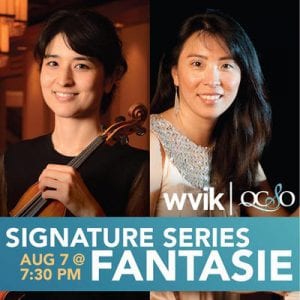
Marian Lee and QCSO concertmaster Naha Greenholtz performed Florence Price’s “Fantasie” in a Signature Series concert last summer.
“With all the protests, it’s a very strong, almost anthemic piece,” Lee said. “It’s interesting, I picked those two pieces during the summer, when those two themes were really important over the summer, and they’re still important to this day, even more so. Together, with what’s going on, it was very appropriate for Martin Luther King Day.”
They’re also more timely now, as we’re approaching the inauguration of the 46th President of the United States, Joe Biden, she said.
“I am happy I chose ‘Together We Rise’ as my closing piece, that has a very strong message and feeling,” Lee said. “To me, the inauguration is going to be the beginning of a new administration, new hope. I really hope all together, we get through this difficult period. I really am convinced that our Founding Father, they were incredibly brilliant coming up with these three branches of government, and they have held.”
Composer preaches patience, unity
Campbell – who was nominated in 2020 for a Mid-America Emmy for his music in Fourth Wall Films’ docudrama “Sons & Daughters of Thunder” – wrote “All in Due Time” for left hand alone in 2018, after he lost the use of his right arm due to an injury to his elbow.
“There aren’t many contemporary piano pieces for left hand alone,” he said Saturday. “I had surgery in 2018, and I wrote this piece in response to that – a reflection of my feelings. I didn’t know if I ever was going to play the piano again. That really shook me. I had to keep that connection, still I had my left hand, and gradually I created that piece.”
“The title of it is, because when we get into these times where we are full of either self-pity or doubt or actual pain — physical or emotional pain — what fills us with the power to go on is hope,” Campbell said, “and the knowledge that someday everything will be OK again. Maybe not in the same way it was, but we will recover, all in due time.”
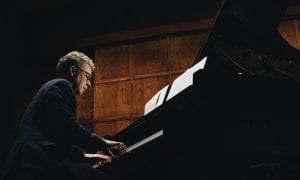
Bill Campbell is professor of music at St. Ambrose University.
It was a hard, 18-month process of recovery, until early 2020, when he was able to fully return to playing piano with both hands. Campbell recalled the famous Maurice Ravel piano concerto for the left hand, which was written for a World War I soldier. (You can hear it HERE.)
26-year-old pianist Paul Wittgenstein was serving as a junior officer in the Austro-Hungarian army and in August 1914, he was shot by Russians in his right elbow. His comrades managed to get him to a field hospital, but the doctors were forced to amputate most of his right arm. As he regained consciousness, he realized that his career as a pianist would never be the same, according to Houston Symphony program notes in 2018, at Houstonsymphony.org.
As a member of one of the wealthiest and most distinguished families in Europe (his younger brother, Ludwig Wittgenstein, would become a famous philosopher), he was able to commission many of the leading composers of the day to write new works for piano that only required the use of the left hand. Richard Strauss, Sergei Prokofiev and Benjamin Britten would all compose pieces for him, but perhaps the greatest work he commissioned is Ravel’s concerto.
The French composer met Wittgenstein in March 1929, and completed the concerto by September 1930. At 55, Ravel was at the height of his fame and powers, and he was intrigued by the challenge of composing a piano concerto that used only one hand.
“A severe limitation of this sort poses a rather arduous problem for the composer. The attempts at resolving this problem, moreover, are extremely rare,” he explained. “The fear of difficulty, however, is never as keen as the pleasure of contending with it, and, if possible, of overcoming it.”
Campbell said his left-hand piece connects with people “in a very simple, pure way; part of it is because of the title, what it means,” he said. “And part of it is the simplicity of the music itself, but it’s not easy to play. It was a great limit to put on myself — sometimes we need
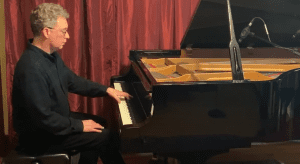
William Campbell of St. Ambrose performing his “All in Due Time” last May.
boundaries to create something. You look at things as a problem or look at things as an opportunity. I found myself struggling, but I was able to create a beautiful piece of music.”
You can see the composer play “All in Due Time” HERE.
His “Together We Rise” was penned last year in response to the “socio-political problems we find ourselves in today,” Campbell said Saturday. “I’m a firm believer in strength through unity, and the inherent worth of every living being.
“There are many ways we can move forward as a society together,” he said, noting the piece’s main motif moves through different keys, rhythms and meters.
“With the shifts in tonality and rhythm, show you the motif from a different perspective,” Campbell said. “You’re not only looking from your own myopic point of view.”
“Together We Rise” isn’t really a classical piece, he added, and that after he premiered it last May at Ambrose, he revised it significantly and looks forward to hearing Lee perform it.
“I think it’s wonderful she is taking these pieces, starting to own them in her way,” Campbell said. “It’s beautiful to hear someone else play my music at the piano. She plays it a little differently. They mean something different to her. She’s going to bring out different things.”
Other classics on the program
Her Monday program includes the seventh work from a set of 10 pieces by one of the 20th-century’s major Russian composers and pianists, Sergei Prokofiev – the effervescent Prelude in C, aptly nicknamed “The Harp.”
The legendary romantic Russian composer and virtuoso pianist, Sergei Rachmaninov’s 13 Preludes, Op. 32: No. 12 in G# minor (Allegro)
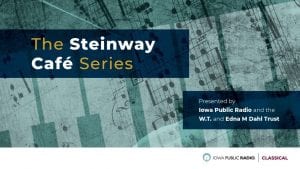
Iowa Public Radio’s Steinway Cafe series will feature Marian Lee Jan. 11 at noon.
appears next in Lee’s Virtual Steinway Café playlist. The work was composed by Rachmaninov in 1910 to polish off his goal of composing 24 preludes that explore all the different major and minor keys.
She also chose an evocative and greatly admired nocturne by one of the most legendary composers for the piano, Frederic Chopin.
Jeremy Seipmann, author of “Chopin: The Reluctant Romantic,” calls Chopin’s Nocturne in D-flat, Op. 27, No. 2, “an unsurpassed jewel of craftsmanship in every sense: in its uniquely delicate and seductive sonorities, in the extraordinary, bel canto elaborations of its melody, in its harmonic subtlety and its Classical proportions.”
IPR Classical’s Steinway Cafe series hosts live, in-studio performance on its renovated 1918 Steinway piano over the noon hour. Due to social distancing measures and ongoing health concerns surrounding Covid, it began hosting the virtual Steinway Cafe performances on May 8, 2020 on Facebook and streaming at iowapublicradio.org.
That soloist also has a Q-C connection – former QCSO executive director Ben Loeb performed then from his home studio, showcasing the music of Iowa composer Ben Hippin and celebrating the 250th anniversary of Beethoven’s birth.
Loeb is known as a concert pianist, conductor, and former Davenport resident.
You can see Monday’s concert at www.facebook.com/SAUMusicDepartment, or www.facebook.com/IowaPublicRadio.





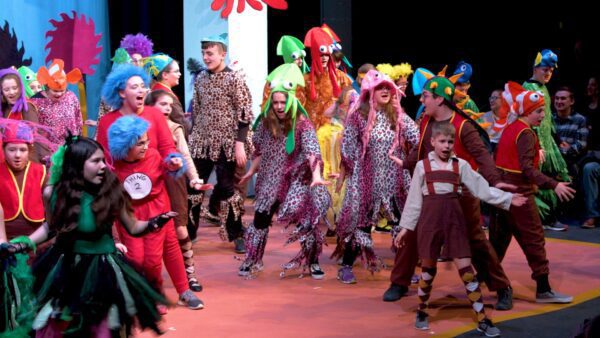







Leave a Reply
You must be logged in to post a comment.